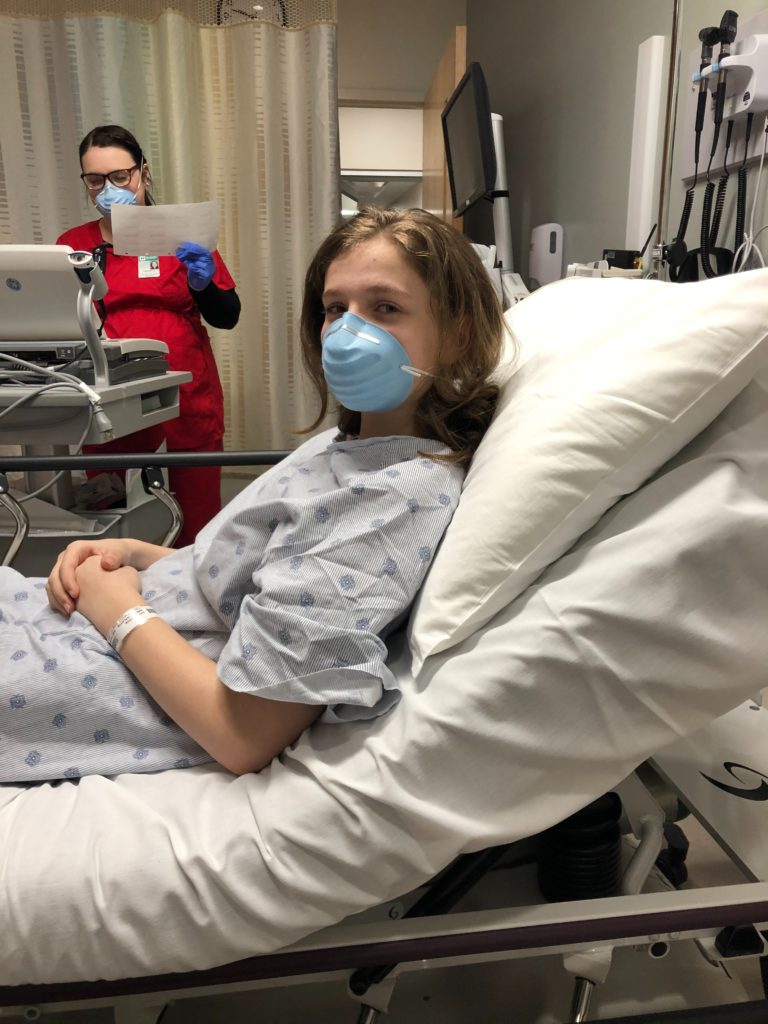
A Checklist for People with Disabilities
Edition 2.0 05.23.20
It is time to think through all that you may face if you require medical care in a hospital. Know that it is NOT business as usual. You should do everything you can to stay out of a hospital, but if you have no choice, BE PREPARED!
Healthcare staff may not or do not hold the same attitudes about your quality of life that you do. Also, the COVID-19 pandemic has changed the usual standards of practice; “usual” standards are not followed. This is because hospitals need to help many more people than they usually do.
It’s up to you and your advocates to prepare if you must go to a hospital or long-term care facility. Be your own best advocate. Do your preparation. Below are some tips to help:
Pack a “Grab & Go” Bag
Make a “grab before you go” list of what you want with you in a hospital and put those things
in a bag. Have that bag readily accessible in case you need to go quickly. You need to do this NOW, while you’re sharp, thinking clearly, and not sick or in a panic with little time to pack.
Checklist of items for your bag:
Attached to your body in some way (around your neck, your wrist, your ankle), a plastic bag that contains the items in this list. You want to keep this bag with you at all costs. Things get easily lost, go missing, or are taken away by healthcare staff. So, this is your only hope if you are there are alone, without an advocate or attendant.
□ Hard copies of important documentation in plastic sleeves or bags:
• Your emergency health information including health insurance cards, state ID, allergies, equipment, communication needs, preferred treatment, medical providers, and medications (sample form can be found at https://hfcdhp.org/wpcontent/uploads/Emergency-v1.pdf Put each of these documents in plastic sleeves to protect them
• Updated advanced directives (e.g., medical and property powers of attorney), again in a plastic sleeve.
• Your emergency contact list (names of people you want contacted, phone numbers, email addresses) in priority order.
• Identify who speaks for you if you cannot talk or communicate with staff.
Page 2 of 4
• The signage you want in your room (names of nurses and other staff are usually written on a whiteboard in a hospital room — What do you want people coming into your room to know about you?). Examples of signage in your room:
o For more information about me, call Maria (first) at 555-555-5555 or Dan
(second) at 666-666-6666.
o Hard of hearing, use communication board.
o Deaf – call for ASL interpreter.
o Blind – introduce yourself and tell me what you are doing!
• Communication tools you prefer to use, again in plastic sleeves. Examples of communication tools follow. More samples and information can be found at
https://www.patientprovidercommunication.org/supporting-communicationcovid-19.htm


Questions to ask for YES/NO answers
Non-Communicating Adult Pain Checklist
COVID-19 Communication Resources from:
□ Your cell phone and charger in a Ziplock bag.
□ Your medications, knowing you may not be able to use them if the hospital determines they need to prescribe for you while under their care.
□ Use a permanent marker like a Sharpie to write important critical information about you and your needs on your skin (your tummy, chest, arm) where hospital staff are likely to see Page 3 of 4
it. For example, Diabetic. Blind. Paraplegic. Rheumatoid Arthritis – can’t bend joints, cannot breathe on my stomach, etc.
Call the hospital you would typically use to find out their policy about having your support person stay with you. But, due to infection prevention rules, this can be difficult. Support persons or companions include family, significant others, partners, personal care assistants or attendants, designated support personnel, or other designated caregivers and
communicators. A support person helps you express and address basic physical needs that are not apparent to someone who does not know you. Such help could communicate your discomfort, pain, hunger, thirst, changes in your symptoms or needs, or questions that need to be asked. When you are denied access to a support person, you are at greater risk of
getting a poorer medical care and having worse health outcome. See below Healthcare Facilities Visitation Policies
Another Resource: Chaplains may be a resource to you in the hospital. They can help you with contacting your family or loved ones and may be an advocate for you. Ask any nurse to see a chaplain. If there is a disagreement between you and the medical staff, you may ask for a review by an Ethics Committee (which is required to meet at your request). But, like other
standards, this may not happen during the COVID-19 crisis.
For more information:
Healthcare Facilities Visitation Policies
- ADA Compliance with Visitations in Healthcare Facilities: Coronavirus
Pandemic Guidance for Advocates http://www.jik.com/c19.html - Offers tips for advocating for visitations and working with healthcare facilities and state governments during current pandemic crisis about how to ensure healthcare facilities comply with Americans with Disabilities Act. Hospital Visitation for People with Disabilities:
https://www.disabilityrightsca.org/post/coronavirus-hospital-visitation - Evaluation Framework for Hospital Visitor Policies:
https://drive.google.com/file/d/1dr2L1AvQkVQtrZaK-SzHrd_NMuMK_F6N/view - COVID-19 Plan and Preparation Guide for Adults Living with Neuromuscular Disabilities: https://docs.google.com/document/d/1XijlvgjO7ntCLohevgOuVrB5II4sgws4elFeRJZvJ4k/e
dit - “Know Your Rights” toolkit for people facing potential triage discrimination based on disability or weight during the COVID-19 pandemic:
https://docs.google.com/document/d/1td5Uq2R_ivBLzPzamnq41T89nLD1UetHzS9tGr1fsk/edit - Preventing Discrimination in the Treatment of COVID-19 Patients: The Illegality of Medical Rationing on the Basis of Disability: https://dredf.org/the-illegality-of-medicalrationing-on-the-basis-of-disability/
- Know Your Healthcare Disability Rights factsheet (available in multiple languages): https://dredf.org/covid-19-advocacy-and-resources/
- “Don’t Deny Disabled People Ventilators” op-ed by National Council on Disability Chairman Neil Romano and Sam Bagenstos https://www.washingtonpost.com/outlook/2020/04/06/coronavirusventilators-disabled-people/
Questions? Contact June Isaacson Kailes, Disability Policy Consultant, jik@pacbell.net or go to www.jik.com
